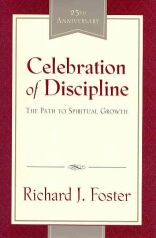A Conversation Between Friends
 Last night, we continued our series on the spiritual disciplines by talking about Prayer. This is somewhat of a continuation from last week when we talked about Meditation and listening to God. We have to see these two disciplines as inseperable when we are interacting with God. Without the ability or desire to listen to God when we're talking to him, we're merely making a speech.
Last night, we continued our series on the spiritual disciplines by talking about Prayer. This is somewhat of a continuation from last week when we talked about Meditation and listening to God. We have to see these two disciplines as inseperable when we are interacting with God. Without the ability or desire to listen to God when we're talking to him, we're merely making a speech.When we come to God in prayer, we need to first be thankful that this interchange is even possible! Think of the loving heart of God, the King of the universe, that he would be not only willing to interact with us but that he desires that interaction with us. Nothing could make that fact more evident than Jesus' cross, which paved the way for us to reconnect with God.
Prayer comes in many forms, just as your interactions with another person may come in many forms. We're probably most familiar with supplication, a fancy word that means to ask God for stuff. And then there's intercession, a fancy word that means to ask God for stuff on other peoples' behalf. Both of these are very valid forms of prayer and very important components of our relationship with God.
Another approach to prayer that is often overlooked, however, is simple conversation with God about how things are going. Many times when I didn't know what to pray for, I would hear God ask very simply, "How do you feel?" I didn't need to make an elequant requests or craft any brilliant overchores to God - He simply wanted me to talk to him. I would tell him if I was particularly worried about something and why. Or I'd tell him I was excited about something that was about to happen and talk about why. And then I would just be quiet for a while and see if God wanted to say anything to me about these things.
It probably goes without say that, of course, God knows what you're telling him or asking for in prayer long before you even say it. Many times it is you that doesn't know what you're feeling till you begin to talk about it with God. But even moreso, I believe that God simply enjoys hearing his childrens' voices. And as we talk with our Father, we begin to develop a sort of "casual intimacy" around him. There's a comfort level that begins to grow as simply spend time in his presence. After a while, not only do we feel more comfortable in his presence but we begin to desire it more and more.
Next week we'll talk more about that desire when we focus on Fasting as a spiritual discipline. We'll talk about what it means to develop a hunger for God and how to find (or re-find) that in your life.



